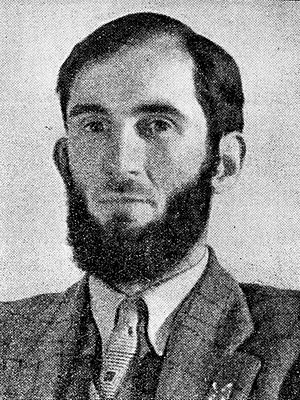Douglas Young (classicist) facts for kids
Quick facts for kids
Douglas Young
|
|
|---|---|

Young, c. 1945
|
|
| Leader of the Scottish National Party | |
| In office 30 May 1942 – 9 June 1945 |
|
| Preceded by | William Power |
| Succeeded by | Bruce Watson |
| Personal details | |
| Born | 5 June 1913 Tayport, Fife, Scotland |
| Died | 23 October 1973 (aged 60) Chapel Hill, North Carolina, United States |
| Political party | Scottish National Party |
| Other political affiliations |
Labour Party |
| Spouse | Helena Auchterlonie (m. 1943–1973) |
| Children | 2 |
| Alma mater | University of St Andrews University of Oxford |
| Profession | Lecturer, Professor (Classics) |
Douglas Cuthbert Colquhoun Young (born June 5, 1913 – died October 23, 1973) was a talented Scottish poet, a smart scholar, a translator (someone who changes words from one language to another), and a politician. He led the Scottish National Party (SNP) from 1942 to 1945. He also taught Classics (the study of ancient Greek and Roman cultures) as a professor at universities in Canada and the United States.
Contents
Douglas Young's Early Life and School
Douglas Young was born in Tayport, Fife, Scotland. His father worked in India for a company that made jute (a strong fiber). Even though his family lived in India, his father wanted Douglas to be born in Scotland.
Soon after he was born, Douglas went to India with his mother. He spent his early childhood there and learned to speak Urdu as a second language.
When he was eight, Douglas went to Merchiston Castle School in Edinburgh. There, he became very interested in history and the Classics. He then studied at the University of St Andrews and later at New College, Oxford. Douglas was very tall, about 6 feet 7 inches (200 cm). He was also known as a polymath, which means he was good at many different subjects.
Douglas Young: A Classicist and Scholar
Douglas Young started his career teaching Greek at the University of Aberdeen from 1938 to 1941. After World War II, he taught Latin at University College, Dundee and then Greek at the University of St Andrews.
He was famous for translating an ancient Greek comedy called The Birds by Aristophanes. His translated version, called The Burdies, was first performed in Edinburgh in 1959.
In 1952, Douglas Young traveled to the Soviet Union with other writers. He met several Russian authors there. He also served as the president of Scottish PEN, a group that supports writers, from 1958 to 1962.
Later, in 1968, he moved to Canada to teach Classics at McMaster University. From 1970 until he passed away, he was a professor at the University of North Carolina at Chapel Hill in the United States.
Douglas Young's Political Journey
Douglas Young was a member of the Labour Party before he joined the Scottish National Party (SNP) in 1938. He became the leader of the SNP in 1942.
SNP During World War II
During World War II, the SNP believed that Scots should only be required to join the military by a Scottish government, not the British government. Douglas Young agreed with this. He refused to join the military because he believed the British government did not have the right to make Scots fight outside Scotland.
Because of his beliefs, he spent time in prison twice. While in prison, he spent his time reading Greek books. He also played an old organ for church services.
After his first time in prison, Douglas Young ran in a special election in Kirkcaldy in 1944. He came in second place, showing strong support for his ideas. He was sent to prison a second time later that year for his actions.
After the War
In 1948, Douglas Young left the SNP. He disagreed with a new rule that said members could not also be part of another political party. He had been a member of both the Labour Party and the SNP for a long time.
In 1951, he rejoined the Labour Party. He believed that a Scottish Parliament would soon be created, and he wanted to support this idea through the Labour Party. In 1967, he helped start a new group called the 1320 Club, which also aimed to support Scottish nationalist ideas.
Later Life and Passing
Douglas Young passed away suddenly at his desk in Chapel Hill, North Carolina, on October 23, 1973, when he was 60 years old. He was married to Helena Auchterlonie, a Scottish artist, in 1943. They had two daughters together.
In 2003, a special plaque was put up at the Writers' Museum in Edinburgh to remember him and his contributions.
 | Aaron Henry |
 | T. R. M. Howard |
 | Jesse Jackson |

